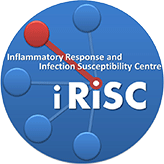Call for applicants: MSCA Individual Fellowships, 2018. Location: Örebro University, Sweden. Research opportunities within innate immunity and inflammation
Inflammatory Response and Infection Susceptibility Centre, iRiSC is a vibrant research group focusing on translational research within innate immunity and inflammation. They are looking for a skilled post-doc to join the team to study the function and regulation of inflammasomes.
Please note, the call for applicant(s) is designed to identify suitable candidate(s) to develop MSCA IF application(s) with Örebro University. Commencement of the fellowship is conditional upon European Commission funding (Horizon 2020, Research and Innovation programme)
The MSCA Individual Fellowships forms part of the Horizon 2020, Research and Innovation programme
Find out more about the MSCA IF here.
Are you the one?
Are you the one?If you're interested to become a Fellow with the IRISC research group at Örebro University, please send a copy of your CV along with a description of your main research interests and experience to: iRiSC@oru.se
 About the host : Inflammatory Response and Infection Susceptibility Centre, iRiSC currently host 10 professors, 12 junior scientists and 7 PhD students. Our motto is "Excellence together", meaning that we a have a clear focus set on collaboration involving scientists and clinicians from widely differing disciplines, departments, hospitals and countries. It also includes having a plan for career development to boost the junior researchers in our group. By this structure, post docs/young research associates rest on the support of a multi-disciplinary reference group rather than being based in a specific research group. This gives freedom for the young researcher to develop as an independent scientist but at the same time provides a solid scientific backing that ensures high research quality.
About the host : Inflammatory Response and Infection Susceptibility Centre, iRiSC currently host 10 professors, 12 junior scientists and 7 PhD students. Our motto is "Excellence together", meaning that we a have a clear focus set on collaboration involving scientists and clinicians from widely differing disciplines, departments, hospitals and countries. It also includes having a plan for career development to boost the junior researchers in our group. By this structure, post docs/young research associates rest on the support of a multi-disciplinary reference group rather than being based in a specific research group. This gives freedom for the young researcher to develop as an independent scientist but at the same time provides a solid scientific backing that ensures high research quality.
Research area: iRiSC provides a strong base with clinical and biomedical knowledge and methodology required for investigating the mechanisms of inflammation of humans during healthy aging and disease, with a special focus on innate immunity, inflammatory dysregulation, inter-individual variations in the inflammasome/caspase-1/IL-1β-axis affecting the outcome of inflammation. We focus on human immunology and have a plethora of projects ranging from sepsis to mental illness, all with a clear focus on deciphering the aspects of innate immunity and the involvement of inflammatory mechanisms in a wide range of pathologies. All projects involve relevant human patient cohorts.
Specific research interest: Cells of the innate immune system respond to foreign material through receptors present on the cell surface or inside the cells and initiate an inflammatory response for an effective removal of the danger. During the last decade, inflammasomes; multi-protein complexes responsible for the response to a variety of danger signals have been described. Most inflammasomes are specific to aligand but the NLRP3-inflammasome acts a sentinel for diverse danger molecules ranging from bacterial components to dust particles, and, upon activation, each cell only produce one NLRP3-inflammasome. The main function of inflammasomes involve production of potent proinflammatory signaling molecules and regulation a controlled cell death, called pyroptosis; all depending on the activity of caspase-1. We have previously reported how exaggerated NLRP3-inflammasome activity cause severe systemic inflammatory disorders and have identified gene variants of the NLRP3 inflammasome that impact inter-individual variations in the inflammatory response. The gene variants affect central components of the multi-protein complex that is the inflammasome but how these gene variants affect the regulation and function of inflammasomes are unknown. Several proteins proposed to take part in the multi-protein complex have been described, some of them proposed to enhance or inhibit the functionality of the inflammasome. We now pursue how the inflammasome is regulated and how gene variants in the inflammasome components affect the functionality as well as understanding how the proteins CARD-only proteins (COPs) and PYD-only proteins (POPs) modulate the activity of inflammasomes. We are now looking to recruit a skilled post-doc to lead this work in deciphering how the inflammasomes are regulated by COPs/POPs as well as to which genetic factors are in play for the functionality of this fascinating multiprotein complex.

